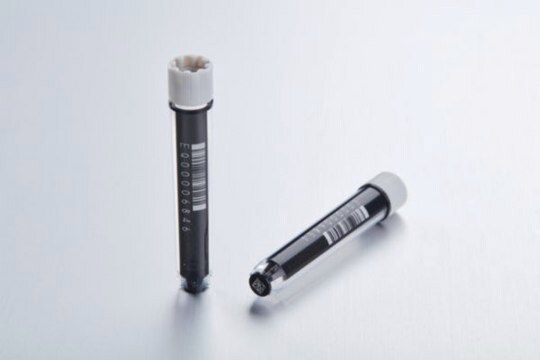EP0030079400
Eppendorf CryoStorage Vials with SafeCode system (data matrix code, barcode and plain text labels)
non-sterile, capacity 0.5 mL, pack of 960 × (10 x individually packed racks with 96 vials each)
Synonyme(s) :
Cryogenic vials, Eppendorf® 2D Coded Vials, Eppendorf® SafeCode Vials
About This Item
Produits recommandés
Matériaux
flat bottom
polypropylene
screw top cap
Stérilité
non-sterile
Caractéristiques
DNase free
endotoxin free
neck thread External
Fabricant/nom de marque
Eppendorf® 0030079400
Conditionnement
pack of 960 × (10 x individually packed racks with 96 vials each)
Paramètres
temp. range at -196 °C
Capacité
0.5 mL
Vous recherchez des produits similaires ? Visite Guide de comparaison des produits
Description générale
"Every stored vessel must be labeled" - every laboratory employee agrees. However, the reality is different: in every ULT freezer there is at least one container without labeling or with completely illegible labeling. It is recommended that vessels be clearly labeled so that they can be easily and reliably identified by anyone. Minimum requirements for reliable reading are printed plain text labels on the vessels. One step further in the direction of fast and reliable sample identification is then labeling with barcodes, barcoding.
A barcode is a machine-readable visual representation of data.
A barcode is a machine-readable visual representation of data. With classic 1D barcodes, the data is encoded by bars of different widths and gaps in between. Two-dimensional codes (2D) are based on points, hexagons, rectangles or other geometric patterns. These codes are also referred to as data matrix codes.
The following specifications apply to 2D codes:
- The edge pattern (finder pattern) consists of two constant lines on the left and below, the "clock track"
- The quiet zone (quiet zone) surrounds the edge pattern, it should not contain any black and white contrast
- The code can be white on a black background or black on a white background.
The Eppendorf CryoStorage Vials offer secure sample IDs and simple and fast sample identification through 3-level coding:
- 1D barcode (side)
- Plain text (side)
- 2D data matrix code with ECC 200 error correction (bottom)
Application
Caractéristiques et avantages
ECC 200 error correction function enables safe code reading with up to 30 % damaged codes
Temperature range: -196 °C (gas phase of LN2) to +121 °C
Manufactured from high-quality polypropylene in class VIII cleanroom for highest sample purity
Pre-capped and pre-racked for comfortable handling
Additional information on vials available via Eppendorf website for documentation purposes
Direct import into Eppendorf eLABInventory and eLABJournal software for convenient handling
Informations légales
Certificats d'analyse (COA)
Recherchez un Certificats d'analyse (COA) en saisissant le numéro de lot du produit. Les numéros de lot figurent sur l'étiquette du produit après les mots "Lot" ou "Batch".
Déjà en possession de ce produit ?
Retrouvez la documentation relative aux produits que vous avez récemment achetés dans la Bibliothèque de documents.
Notre équipe de scientifiques dispose d'une expérience dans tous les secteurs de la recherche, notamment en sciences de la vie, science des matériaux, synthèse chimique, chromatographie, analyse et dans de nombreux autres domaines..
Contacter notre Service technique







